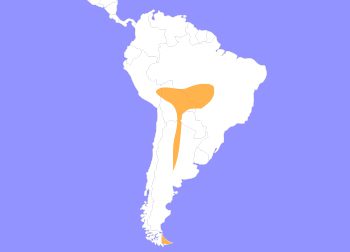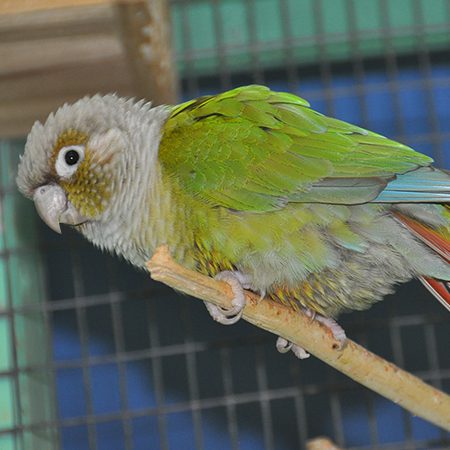Green Cheek Conure
Pyrrhura molinae
The green cheeked conure also green cheeked parakeet, is a small parrot of the genus Pyrrhura. Conure is a popular name for this type of bird in aviculture. It is native to the forests of South America. The green cheeked parakeet is typically 10 in long and weighs 60 to 80 g. It is mainly green, with a brown/black/grey crown, white eye rings, a grey beak, and its long pointed tail is mostly maroon. Males and females have an identical external appearance.
The green-cheeked parakeet occurs in west-central and southern Mato Grosso, Brazil, northern and eastern Bolivia, northwestern Argentina, and western Paraguay. Its habitat is forests and woodland, where it usually forms flocks of 10 to 20 individuals at treetop level, or larger flocks where there is more food. It is also emerging as a popular pet for families and individuals. The green cheeked conure eats various seeds, vegetables and fruits. The average clutch is 4–6 eggs. Average incubation is 25 days, varying from 22 to 25 days. They are the quietest of the conures and can learn to have a limited vocabulary, with extensive training.

Green Cheek Conures occur naturally in South America, ranging in parts of Brazil and Bolivia.
HABITAT -Its habitat is forests and woodland of South America.
DIET -They are herbivorous, its diet consists of seeds, vegetables, and fruits.
FUN FACT -These birds love to whistle! It can be encouraged playing an audio track of whistling.
SOCIAL BEHAVIOR -They are sociable forming flocks in the wild. They can be affectionate pets.
ACTIVITY -They are diurnal being most active during the day and resting during the evening.
PREDATORS -Predators including the false vampire bat and larger birds of prey.
SIZE -They are typically 10 in long and weigh 60 to 80 g.
RELATIVES -They belong to the genus Pyrrhura, being related to various parakeet species like the Ochre-marked parakeet.
CONSERVATION -Green-cheeked conures are categorized as LC (Least Concern) species by the IUCN.
Cub Creek Animal Care Information
Housing - Our green cheek conure lives in the Habitats room in a spacious enclosure with two of our lemurs. Their enclosure has several trees and many interconnection branches to create places to explore and perch on. There is also a nest box to sleep in as well as a window that allows them to see what is going on outside.
Diet - These birds are fed ZuPreem FruitBlend medium bird pellets that give them all the vitamins and nutrients they need to be healthy. They also get fresh bird salad daily, which includes apple, shredded sweet potato, and greens. They are also given access to fresh water daily.
Enrichment - Their multi-species enclosure (with lemurs and another bird species) provides enrichment through daily interactions and get to play with toys that are made for the others. Campers can use cardboard, twine, and pretty much anything we can find to make hanging toys that can have food hidden in them or just used to swing on! Dole loves talking to people and bobbing his head along with you!

